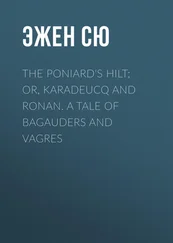Эжен Сю - The Seven Cardinal Sins - Envy and Indolence
Здесь есть возможность читать онлайн «Эжен Сю - The Seven Cardinal Sins - Envy and Indolence» — ознакомительный отрывок электронной книги совершенно бесплатно, а после прочтения отрывка купить полную версию. В некоторых случаях можно слушать аудио, скачать через торрент в формате fb2 и присутствует краткое содержание. Жанр: literature_19, foreign_antique, foreign_prose, на английском языке. Описание произведения, (предисловие) а так же отзывы посетителей доступны на портале библиотеки ЛибКат.
- Название:The Seven Cardinal Sins: Envy and Indolence
- Автор:
- Жанр:
- Год:неизвестен
- ISBN:нет данных
- Рейтинг книги:3 / 5. Голосов: 1
-
Избранное:Добавить в избранное
- Отзывы:
-
Ваша оценка:
- 60
- 1
- 2
- 3
- 4
- 5
The Seven Cardinal Sins: Envy and Indolence: краткое содержание, описание и аннотация
Предлагаем к чтению аннотацию, описание, краткое содержание или предисловие (зависит от того, что написал сам автор книги «The Seven Cardinal Sins: Envy and Indolence»). Если вы не нашли необходимую информацию о книге — напишите в комментариях, мы постараемся отыскать её.
The Seven Cardinal Sins: Envy and Indolence — читать онлайн ознакомительный отрывок
Ниже представлен текст книги, разбитый по страницам. Система сохранения места последней прочитанной страницы, позволяет с удобством читать онлайн бесплатно книгу «The Seven Cardinal Sins: Envy and Indolence», без необходимости каждый раз заново искать на чём Вы остановились. Поставьте закладку, и сможете в любой момент перейти на страницу, на которой закончили чтение.
Интервал:
Закладка:
"How wonderful!" exclaimed Madame Bastien, examining all these treasures with great curiosity and interest. "See, Frederick, here is a living book in which one can study the customs, habits, and history of this singular country, for here is also a collection of medals, coins, drawings, and manuscripts."
"Say, mother!" exclaimed Frederick, "how pleasantly and profitably one could spend the long winter evenings here in reading about China, and comparing, or rather verifying the descriptions in the book with nature, so to speak."
"M. de Pont Brillant must often visit this curious and interesting pavilion, I am sure," said Marie, turning to M. Dutilleul.
"M. le marquis has never been a victim to the Chinese craze, madame," was the reply. "He likes hunting much better. It was his great-grandfather who had this house built, because it was the fashion at that time, that is all."
Marie could not help shrugging her shoulders the least bit in the world, and exchanging a half-smile with her son, who seemed to become more and more thoughtful as he followed his mother, to whom the doctor had offered his arm to conduct her along a winding path leading from the winter-garden to a rocky grotto, lighted by large, lens-shaped pieces of blue glass inserted in the rocks, which imparted to this subterranean chamber, ornamented with beautiful sea-shells and coral, a pale light similar to that which pervades the depths of the ocean.
"We are going to the home of the water-nymphs now, are we not?" asked Madame Bastien, gaily, as she began the descent. "Isn't some mermaid coming to welcome us upon the threshold of her watery empire?"
"Nothing of the kind," replied the doctor. "This subterranean passage, carpeted, as you see, and always kept warm during the winter, leads to the château; for you must have noticed that all the different buildings we have seen are connected by covered passages, so in winter one can go from one to the other without fearing rain or cold."
In fact, this grotto was connected, by a spiral staircase, with the end of a long gallery called the Guards' Hall, and which in years gone by had probably served for that purpose. Ten windows of stained glass, with the Pont Brillant coat-of-arms emblazoned upon them, lighted this immense room finished in richly carved oak, with a sky ceiling divided by heavy groins of carved oak.
Ten figures in complete suits of armour, helmet on head, visor down, halberd in hand, sword at side, were ranged in line on the other side of the gallery, facing, and directly opposite the ten windows, where the reflection from the stained glass cast prismatic lights upon the steel armour, making it stand out in vivid relief against the dark woodwork.
In the middle of this hall, upon a pedestal, was a knight, also in a complete suit of armour, mounted upon a battle-steed hewn out of wood, which was entirely hidden by its steel bards and long, richly emblazoned trappings. The knight's armour, which was heavily embossed with gold, was a marvel of the goldsmith's art and of elaborate ornamentation, and M. le chef of the conservatories, pausing in front of the figure, said with a certain amount of family pride:
"This suit of armour was worn by Raoul IV., Sire de Pont Brillant, during the First Crusade, which proves beyond a doubt that the nobility of M. le marquis is of no recent date."
Just then an elderly man, dressed in black, having opened one of the massive doors of the hall, M. Dutilleul remarked to Doctor Dufour:
"Ah, doctor, here is M. Legris, the keeper of the silver. He is a friend of mine. I will ask him to show you about. He will prove a much better guide than I should be."
And advancing toward the old man, M. Dutilleul said:
"My dear Legris, here are some friends of mine who would like to see the castle. I am going to hand them over to you, and in return, whenever any of your acquaintances wish to inspect the hothouses – "
"Our friends' friends are our friends, Dutilleul," replied the keeper of the silver, rather, peremptorily; then, with a rather familiar gesture, he motioned the visitors to follow him into the apartments which a large corps of servants had just finished putting in order.
It would take entirely too long to enumerate all the splendid adornments of this castle, or rather, palace, from the library, which many a large town might have envied, to a superb picture gallery, containing many of the finest specimens of both the old and the modern school of art, upon which the visitors could only cast a hasty glance, for, in spite of the obliging promise made to M. Dutilleul, the keeper of the castle silver seemed rather impatient to get rid of his charges.
The first floor, as M. Dufour had said, consisted of an extensive suite of apartments, each of which might have served as an illustration of some particular epoch in interior decoration between the fourteenth and eighteenth centuries; in short, it was a veritable museum, though of an essentially private character, by reason of the many family portraits and the valuable relics of every sort and kind which had belonged to different members of this great and ancient house.
In one of the wings on the second floor were the apartments of the dowager Marquise de Pont Brillant. In spite of that lady's advanced age, these rooms had been newly fitted up in the daintiest, most coquettish style imaginable. There was a profusion of lace and gilding and costly brocades, as well as of elaborately carved rosewood furniture, and superb ornaments of Sevres and Dresden china. The bedchamber, hung with pink and white brocade, with a canopied bedstead decorated with big bunches of white ostrich feathers, was especially charming. The dressing-room was really a ravishing boudoir hung with pale blue satin, studded with marguerites. In the middle of this room, furnished in gilded rosewood, like the adjoining bedchamber, was a magnificent dressing-table, draped with costly lace caught back with knots of ribbon, and covered with toilet articles, some of wrought gold, others of sky-blue Sevres.
Our three friends had just entered this apartment when a haughty, arrogant-looking man appeared in the doorway. This personage, who wore a bit of red ribbon in the buttonhole of his long frock coat, was nothing more or less than my lord steward of the castle and surrounding domain.
On seeing the three strangers, this high and mighty personage frowned with an intensely surprised and displeased air.
"What are you doing here?" he demanded, imperiously, of his subordinate, M. Legris. "Why are you not attending to your silver? Who are these people?"
On hearing these discourteous words, Madame Bastien turned scarlet with confusion, the little doctor straightened himself up to his full height, and Frederick rashly muttered, under his breath, "Insolent creature!" as he stepped a little closer to his mother.
Madame Bastien gave her son's hand a warning pressure, as she slightly shrugged her shoulder as if to show her disdain.
"They are some friends of Dutilleul's, M. Desmazures," replied M. Legris, humbly. "He asked me to take them through the chateau, and – and I thought – "
"Why, this is outrageous!" exclaimed the steward, interrupting him. "I never heard of such assurance. Such a thing wouldn't be allowed in the house of a tradesman on the Rue St. Denis! The idea of taking the first person that comes along into the apartments of madame la marquise, in this fashion."
"Monsieur," said Doctor Dufour, firmly, walking toward the steward, "Madame Bastien, her son, and myself, who am M. Dutilleul's physician, thought we were committing no indiscretion – nor were we – in accepting an offer to show us the château. I have visited several royal residences, monsieur, and think it well to inform you that I have always been politely treated by the person in charge of them."
Читать дальшеИнтервал:
Закладка:
Похожие книги на «The Seven Cardinal Sins: Envy and Indolence»
Представляем Вашему вниманию похожие книги на «The Seven Cardinal Sins: Envy and Indolence» списком для выбора. Мы отобрали схожую по названию и смыслу литературу в надежде предоставить читателям больше вариантов отыскать новые, интересные, ещё непрочитанные произведения.
Обсуждение, отзывы о книге «The Seven Cardinal Sins: Envy and Indolence» и просто собственные мнения читателей. Оставьте ваши комментарии, напишите, что Вы думаете о произведении, его смысле или главных героях. Укажите что конкретно понравилось, а что нет, и почему Вы так считаете.












